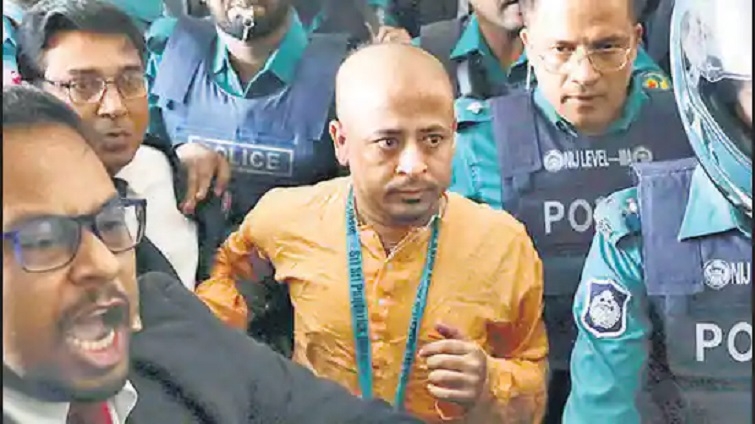B’desh court denies bail to Hindu leader
| Date :27-Nov-2024 |

DHAKA :
A BANGLADESHI court on Tuesday denied bail to prominent Hindu leader Chinmoy Krishna Das Brahmachari, arrested on alleged “sedition” charges, and sent him to prison, amid protests by community members in the capital Dhaka and the port city of Chattogram.
Bangladesh police on Monday arrested Chinmoy Krishna Das Brahmachari, a leader of the
Hindu group Sammilita Sanatani Jote, from the Hazrat Shahjalal International Airport area in Dhaka while travelling to Chattogram. He was then brought to Chattogram.
A case was filed against Das and 18 others on October 30 at Chattogram’s Kotwali Police Station leader on the complaint of a leader of former Prime Minister Khaleda Zia’s Bangladesh Nationalist Party (BNP), which accused them of disrespecting the national flag in the city’s Laldighi Maidan during a rally of the Hindu community on Oct 25.
During the hearing of Das’ case, Chattogram’s Sixth Metropolitan Magistrate Kazi Shariful Islam rejected his bail petition.
The judge said since Das was arrested from outside the port city, as per law he is required to be kept under judicial custody for 24 hours.
The court then ordered that Das be taken to jail and directed the prison authorities to allow the Hindu priest to practice his religious rituals as per the Jail Code.
Officials said Das was escorted to the court amid tight security as a number of his supporters, including lawyers, chanted slogans protesting his arrest.
Witnesses said Das greeted his supporters gathered at the court premises with folded hands as they chanted slogans and asked them to refrain from chanting religious slogans at the scene.
Local Government affairs adviser and Anti-Discrimination Student’s Movement leader Asif Mahmud said Das has been arrested not as a leader of any community but for sedition.
“If someone is involved in any incident like sedition, he will not be spared,” he told reporters following a public rally in north-western Rangpur city.
“If Bangladesh’s sovereignty and independence are endangered or the country is exposed to dishonour or contempt, the government will definitely take steps,” Mahmud said.
Das’ arrest triggered street rallies in Dhaka and Chattogram by Hindus.
Hundreds of people from the Hindu community on Monday took to the streets at the Cheragi Pahar intersection in Chattogram, demanding his immediate release. Similarly, the Hindu community members in Dhaka blocked the Shahbagh intersection, protesting the arrest.
Bangladesh Hindu Buddhist Christian Unity Council also protested Das’ arrest and demanded his immediate release.
Das was also a member of the International Society for Krishna Consciousness (ISKCON), which recently expelled him.
ISKCON leaders in Bangladesh were not immediately available for comments.
Meanwhile, India on Tuesday noted with “deep concern” the arrest and denial of bail to Das, and urged the Bangladeshi authorities to ensure the safety and security of Hindus and all minorities.
In a statement, the Ministry of External Affairs said, “This incident follows the multiple attacks on Hindus and other minorities by extremist elements in Bangladesh.”
There are “several documented cases” of arson and looting of minorities’ homes and business establishments, as well as theft and vandalism and desecration of deities and temples in Bangladesh. “It is unfortunate that while the perpetrators of these incidents remain at large, charges should be pressed against a religious leader presenting legitimate demands through peaceful gatherings,” the statement said.
Bangladesh’s minority Hindus, which constitute only about 8 per cent of the 170 million population, have faced over 200 attacks in 50-odd districts since the fall of Sheikh Hasina’s Awami League government on August 5.
2,010 incidents of attacks on minorities
DHAKA,
Nov 26 (ANI)
ACTING General Secretary of the Bangladesh Hindu Buddhist Christian Unity Council, Manindra Kumar Nath, on Tuesday, said that 2,010 incidents of attacks, including murder, molestation, and kidnapping, were reported against minorities in Bangladesh, affecting 1,705 families.
Speaking to ANI about the ongoing situation in Bangladesh, Nath highlighted the widespread atrocities faced by Hindu, Christian, and Buddhist populations across the country. He noted that despite the scale of the violence, the interim government
had not taken any steps to investigate or hold anyone accountable for these incidents.
“It is very unfortunate... We have seen that almost across all 64 districts of Bangladesh, there have been atrocities against Hindu populations and also against Christians and Buddhists. From that, we have gathered statistics through our organisation, which show that there were 2,010 incidents of attacks, including murder, molestation, and kidnapping, affecting 1,705 families from the community. Despite this, the interim government has not taken any steps to investigate or hold anyone accountable for these incidents,” Manindra Kumar Nath said.
Nath also pointed out that as a result of these atrocities, saints and monks have been protesting in various cities in the country, including Dhaka, Chattogram, and Rampur. These demonstrations, he noted, have faced attempts to disrupt them, with participants being abused and even injured during protests.
“As a result, even saints and monks have come forward to protest against these atrocities through various demonstrations. We have seen protests in Dhaka, in Chattogram, and a large demonstration in Rampur. There have also been attempts to disrupt these demonstrations, with people being abused during the protests. Even after Chinmoy's arrest, there was another protest where people were injured,” he said.
Nath stated that the protests were aimed at advocating for eight key reforms for the Sanatani people. These reforms include demands for time off during religious festivities, investigations into the atrocities, and the right to pray in religious places. Nath stressed that these demands are basic and focused on creating an anti-discriminatory society.
He further criticised the Interim Government for not providing adequate representation for the minority communities and expressed concerns that the absence of such representation is hindering communal progress in the country.
